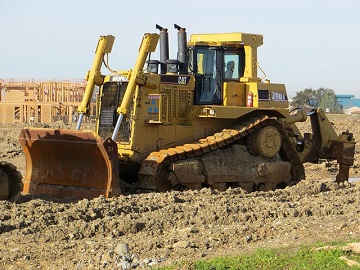Plant acquisition
Contents |
[edit] Introduction
The term ‘plant’ refers to machinery, equipment or apparatus used for an industrial activity. Typically In construction, ‘plant’ refers to heavy machinery and equipment used during construction works.
Construction plant is generally re-useable, and so, as well as being purchased new, it may be purchased second hand or hired. The Construction Plant Hire Association suggest that, ‘The UK plant hire industry is the best established and most professional in the world, and is worth over £4 billion to the UK economy.’
However, many contractors prefer to hire only those plant items which are required to meet peak demand or specialist activities. The decision to purchase plant out-right needs to be carefully weighed up, since it must then be operated at an economic utilisation level to produce a profitable rate of return on the investment.
In other words, the more down time (time when the plant is standing idle) there is, the less value it is providing for the company, and the lower the return on their investment. However, a business may believe that by purchasing and owning outright a plant asset, they will attract more of a specific kind of work and therefore increase business.
There are a number of issues to be considered before purchasing plant:
- Whether the plant will provide an adequate rate of return on the capital employed?
- Can the company obtain the plant through some other means or it is necessary to own it outright?
- Is there the potential of hiring the plant out to others?
- Will it be possible to sell the plant on when it is no longer required?
- What are the maintenance, repair and transport costs associated with using the plant?
- Can it be securely stored when not in use?
- Will finance be necessary?
- Are there options for hire purchase or leasing?
[edit] Cash or outright purchase
This means that the plant may be paid for immediately at the time of purchase. On the company’s balance sheet it will provide a tangible asset. Whether or not this is the most profitable method of investing will depend on the company having the liquid assets required to make the purchase, and being sure that the level of return from the investment is sufficient to make it worthwhile.
[edit] Hire purchase
This involves a contract between the company and a supplier of finance. The company agrees to pay a specific 'rent' during the contract period. The title of the asset may transfer to the company at the end of this period for a previously agreed sum. While this option doesn’t require a large amount of up-front capital on the part of the company, it can involve high rates of interest.
[edit] Leasing
In this case, the title does not pass to the lessee, instead, there is a contract that states the company can obtain the use of a plant asset which is owned by the lessor in return for specified rent payments. The two forms of lease appropriate for acquiring construction plant are:
[edit] Finance lease
Arrangement with a financial institution, where the rental charges cover the asset’s capital cost, in addition to a service charge.
[edit] Operating lease
Arrangement with the manufacturers or suppliers of the asset. This can be a good option where complex plant is being used that requires skilled personnel to operate and service it.
[edit] Find out more
[edit] Related articles on Designing Buildings Wiki
Featured articles and news
The UK’s largest air pollution campaign.
Future Homes Standard, now includes solar, but what else?
Will the new standard, due to in the Autumn, go far enough in terms of performance ?
BSRIA Briefing: Cleaner Air, Better tomorrow
A look back at issues relating to inside and outside air quality, discussed during the BSRIA briefing in 2023.
Restoring Abbotsford's hothouse
Bringing the writer Walter Scott's garden to life.
Reflections on the spending review with CIAT.
Retired firefighter cycles world to raise Grenfell funds
Leaving on 14 June 2025 Stephen will raise money for youth and schools through the Grenfell Foundation.
Key points for construction at a glance with industry reactions.
Functionality, visibility and sustainability
The simpler approach to specification.
Architects, architecture, buildings, and inspiration in film
The close ties between makers and the movies, with our long list of suggested viewing.
SELECT three-point plan for action issued to MSPs
Call for Scottish regulation, green skills and recognition of electrotechnical industry as part of a manifesto for Scottish Parliamentary elections.
UCEM becomes the University of the Built Environment
Major milestone in its 106-year history, follows recent merger with London School of Architecture (LSE).
Professional practical experience for Architects in training
The long process to transform the nature of education and professional practical experience in the Architecture profession following recent reports.
A people-first approach to retrofit
Moving away from the destructive paradigm of fabric-first.
International Electrician Day, 10 June 2025
Celebrating the role of electrical engineers from André-Marie Amperè, today and for the future.
New guide for clients launched at Houses of Parliament
'There has never been a more important time for clients to step up and ...ask the right questions'
The impact of recycled slate tiles
Innovation across the decades.
EPC changes for existing buildings
Changes and their context as the new RdSAP methodology comes into use from 15 June.
























